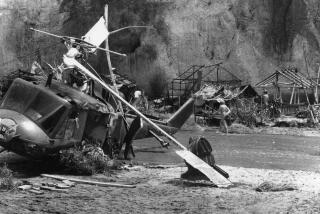A Cross Hangs in the Sky
- Share via
He was like a crucifix hanging in the sky, arms outstretched on each side as he clung to the doorway of a helicopter, feet planted on its skids, looking off to the distance.
I can see him now against the pale blue of a late afternoon, just over the tops of oak trees that grow in clusters down the hill from my home.
Though the helicopter hovered for perhaps only 30 seconds, the image is difficult to forget amid the circumstances that surround it. I’ve been trying to shake it for a month.
The aircraft belonged to the L.A. County Fire Department on a rescue mission. The man in the doorway whose posture appeared so cross-like was Jeff Langley, a paramedic.
A few moments after I saw him, he was dead.
The incident occurred on a quiet Tuesday in the Santa Monica Mountains, a few miles from where I live.
A young man, out of breath from running, asked me to call 911. A climber had fallen off a steep cliff in Topanga State Park. Almost simultaneously, we heard the roar of a helicopter.
The aircraft appeared from the west, hovered momentarily and was gone. It was during that brief view of the chopper that I saw the man in the doorway.
As it turned out, the climber they had airlifted from the foot of a 150-foot cliff had died in the fall.
The helicopter had returned to recover equipment left at the scene. Exactly what happened next might never be known. One moment Langley stood in the doorway of the chopper as it hovered over a canyon, and the next moment he was gone. They found his body in underbrush not far from where the climber had fallen.
News of his death left an unsettling memory of the scene. Paramedics aren’t supposed to die. They’re life-givers, savers, last resorts in moments of pain, fire and tangled debris.
We see them hurtling down the freeways and across the canyons of L.A., or overhead in helicopters, chasing the seconds that will bring them to the place where life forces flicker.
They are not supposed to appear Christ-like in the sky and then plunge to their deaths moments later in the awkward performance of a routine mission.
Paramedics, quite simply, are not supposed to die.
I say that from the standpoint of one who admires them. They work 56-hour weeks under circumstances that would easily tax the resolve of those not similarly committed to saving lives.
Wherever disaster strikes, you can count on a paramedic being there, pressing the limits of safety and endurance to stem the flow of blood or restart a silent heart; to deliver a baby or to breathe life back into a strangled child.
Their environment, unlike the sterile workrooms of most medical technicians, is the street. They crawl into tangled wreckage about to explode into flame, enter buildings about to collapse and rush to riots where bullets fly with deadly caprice.
They work amid the blood and wreckage of situations that occur suddenly and without warning at a rate of stress unknown in any other job.
And sometimes they plunge through the sky like falling birds and die in the very place where, moments before, they were trying to restore life.
Who chooses this kind of career in preference to less taxing and dangerous work? Jeff Langley, who died at age 28, is one example.
Like a lot of kids, he declared early that when he grew up he wanted to be a fireman. Unlike most kids, he never changed his mind.
“He was born caring about others,” his mother, Karen Langley, says.
“He never stopped caring,” his partner, Alan Taylor, adds.
The son of divorced parents, Langley didn’t know his dad. It hurt him, and might have accounted for his own efforts to be everyone’s father.
His short life was filled from teen age on with helping young people.
He taught blind children to ski, volunteered as a lifeguard at the YMCA, visited burn units to comfort the afflicted, counseled kids against drugs and, at 16, studied to become an emergency medical technician.
“He was the designated adult in our family,” Karen Langley says. “He just wanted to help everybody.”
“I don’t know why Jeff cared so much,” his partner says. “I don’t know why I care so much. There’s a lot of little boy in all of us.”
Langley carried a newspaper clipping with him. It contained an anonymous poem on success that included the closing phrase:
To know even one life has breathed easier because you lived
This is to have succeeded.
Success comes in many forms. Paramedics achieve it in life. Jeff Langely symbolizes it in death. I think about that when I remember him hovering like a crucifix against the pristine sky of a quiet Tuesday afternoon.
More to Read
Sign up for Essential California
The most important California stories and recommendations in your inbox every morning.
You may occasionally receive promotional content from the Los Angeles Times.













